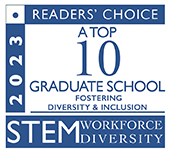Applied Physics and Engineering
Now Accepting Inquiries and Applications!
The STEM-designated M.S. in Applied Physics and Engineering program prepares students with the education and professional skills to be essential societal contributors in the 21st century science, technology, engineering and mathematics workforce.
Through a carefully crafted curriculum, the program is designed to meet the demands of modern industry for young researchers – knowledge of advanced applied physics blended with engineering fields such as nanoscience and quantum engineering; renewable energy research; condensed matter physics; material science and more.
The physics graduate programs emphasizes interdisciplinary experience through challenging coursework that blends a rigorous physics core curriculum with engineering electives. Upon completion of the core coursework, students select one of three research concentrations: Applied Physics, Engineering Physics or Materials Science and Engineering.
Students in the M.S. in Applied Physics and Engineering program at Seton Hall University can take advantage of its corporate partnerships with pharmaceutical industry leaders such as Bristol Myers Squibb, alongside research initiatives in cancer research, plasma research for sustainability, and green science projects such as renewable energy and hydroponic agriculture. These collaborations provide students with exposure to cutting-edge industry practices and challenges and involve them in high-impact research opportunities, working alongside faculty experts. These partnerships prepare graduates for advanced roles in both the commercial and academic sectors.
Why study an Applied Physics Master's?
Studying an Applied Physics master's program merges the analytical depth of physics with practical engineering prowess, preparing you to address multifaceted challenges across high-tech industries. This interdisciplinary training in applied physics courses not only prepares you for innovative roles in applied physics fields such as aerospace, energy, and materials science but also offers enhanced career opportunities through Seton Hall's proximity to New York's vibrant industry sectors.
What opportunities are there for International Students with a STEM-designated M.S. in Applied Physics and Engineering?
International students with a STEM-designated M.S. in Applied Physics and Engineering benefit from up to three years of Optional Practical Training (OPT) in the United States, enhancing their work experience and making them competitive candidates for H-1B visa sponsorship. The STEM designation is highly valued in industries like technology and manufacturing, which often look to retain international talent through the H-1B visa program. Graduates not only gain practical experience but also stand a better chance of securing longer-term employment in the U.S. due to the high demand for specialized skills in the STEM fields.








